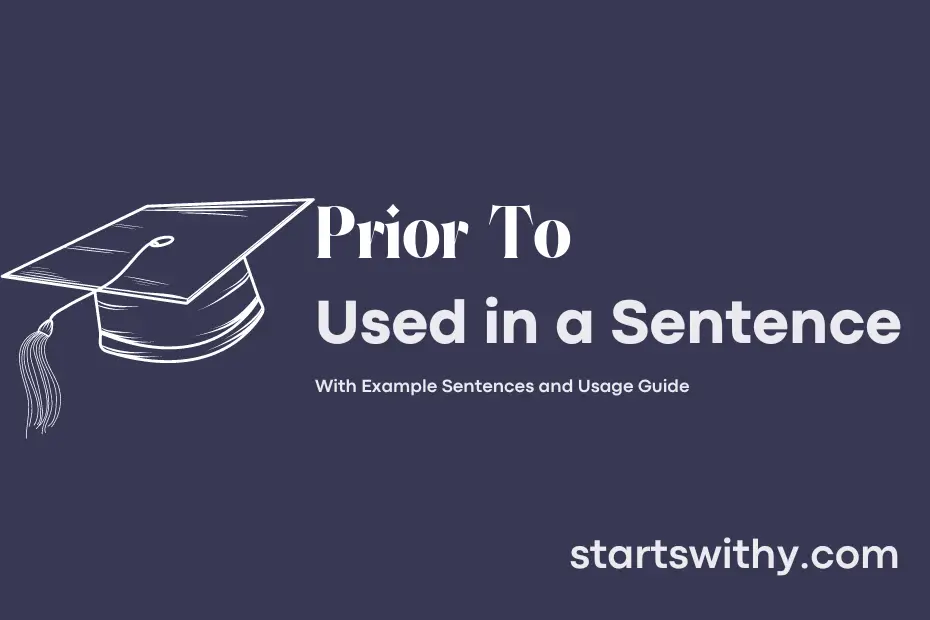Have you ever wondered about proper usage of the phrase “prior to”? “Prior to” means before a specific time or event and is commonly used to denote the sequence of actions or occurrences.
Understanding how to correctly use “prior to” in a sentence can enhance clarity and precision in your writing. Let’s explore some common ways to incorporate this phrase effectively in your communication.
7 Examples Of Prior To Used In a Sentence For Kids
- We must wash our hands prior to eating lunch.
- Let’s gather all our toys prior to going home.
- Please finish your homework prior to bedtime.
- Put on your shoes prior to going outside to play.
- We need to brush our teeth prior to going to bed.
- Wear your uniform prior to going to school.
- Clean up your room prior to playing with your friends.
14 Sentences with Prior To Examples
- Prior to starting classes, students must familiarize themselves with the course syllabus.
- It is advisable to review your notes prior to exams to ensure good performance.
- Make sure to meet with your professors prior to selecting elective courses.
- It is important to finish your assignments prior to their due date to avoid penalties.
- Get enough rest prior to important presentations to stay sharp and focused.
- Prior to attending events on campus, check the schedule for any changes.
- Remember to make a study schedule prior to midterms to manage your time effectively.
- Start researching internships prior to your final year to secure valuable experience.
- Review your previous exam papers prior to seeking help from tutors for better understanding.
- It is recommended to join student organizations prior to networking opportunities.
- Complete your financial aid applications prior to deadlines to secure funding for tuition.
- Make a list of required textbooks prior to the start of the semester for better planning.
- Set academic goals prior to each term to stay motivated and on track.
- Connect with alumni prior to graduation for insights into potential career paths.
How To Use Prior To in Sentences?
Prior To is used to indicate that something happened before a specific time or event. It is important to understand how to use this phrase correctly in a sentence.
For example, “I had never tried sushi prior to last week.” This sentence shows that the speaker tried sushi for the first time last week.
To use Prior To in a sentence, first identify the time or event that you want to refer to as the reference point. Then, place Prior To before the action or event that occurred before the reference point.
Here are a few more examples:
– “She completed her homework prior to going to bed.”
– “The documents must be signed prior to the deadline.”
– “He had never visited Europe prior to his trip last summer.”
Remember to always place Prior To before the action or event it is referring to, to clearly show the sequence of events. It helps the reader understand the timing of actions or events in relation to each other.
By following these guidelines and practicing using Prior To in sentences, you will be able to effectively communicate that something occurred before a specific time or event.
Conclusion
In conclusion, utilizing sentences with “prior to” helps to establish clear and chronological relationships between events or actions. This phrase is commonly used to indicate the sequence of events, providing insights into what occurred before a specific point in time or action took place. By incorporating “prior to” in writing, individuals can enhance the clarity and coherence of their ideas, ensuring that readers can easily follow the progression of events.
Whether used in formal or informal writing, sentences containing “prior to” contribute to the overall organization and structure of the text. This phrase is especially useful in academic papers, reports, or narratives where a precise temporal order is essential for conveying information effectively. By employing sentences with “prior to,” writers can guide their audience through the timeline of events, enabling a better understanding of the context and connections between different occurrences.



